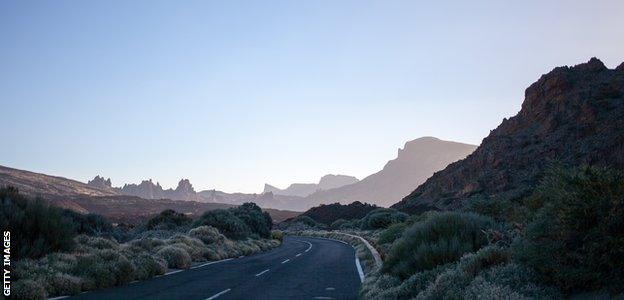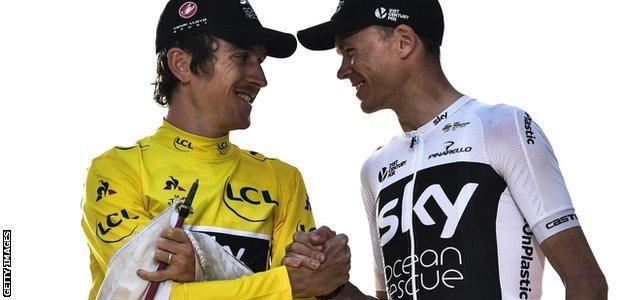Chris Froome's Tenerife training camp: 'You come here to suffer'
- Published
- comments
Tom Fordyce travels to Tenerife to find Chris Froome deep in training
It's the first thing you see as your plane descends towards Tenerife, after the long flight over the grey-blue Atlantic - a ring of thick cloud hiding the island below, and poking through it, like the spire of some great natural cathedral, the peak of Mount Teide.
Most people have come for spring sunshine, for cheap beer and serious sun-lounger time down on the warm coast. Most will only see the top of Teide again on the way out.
Very few have any idea that in their midst is the greatest cyclist of his generation, plus his key lieutenants, heading to this ancient volcano to begin the fightback that he hopes will end with him winning back the title he once appeared to own.
Chris Froome will be 34 when the next Tour de France begins in July. When you meet him he is polite and mild-mannered as always.
Then you see him training on the brutally steep roads that jag up Teide, from the ocean through those clouds up to 2,300 metres, and you hear him talking about the pain he routinely expects to go through, and the metamorphosis begins.
"Chris," says Team Sky's sport director Nico Portal, "is just an animal, a beast.
"He is mentally super, super strong. He's just a normal person, until he gets on a bike - and then he's a racer. He just wants to win."
Froome - and Sky - have been coming to Teide for nine years now. What began as an essential part of the plan to transform Bradley Wiggins into genuine Tour contender - proper climbs, sleeping at altitude, guaranteed weather even in a northern European winter - has become a ritual for all those who have followed him.
You come to Teide to suffer, and you suffer to win cycling's great three-week endurance tests: the Tour, the Giro d'Italia, the Vuelta a Espana. There is one small hotel at the summit of the road, and then nothing but black lava and red rock and sand.
Pavel Sivakov, the precocious 21-year-old Sky rider whose abilities remind team insiders of the young Froome, describes the landscape as feeling like the set of a Star Wars movie. Raquel Welch came here to film One Million Years BC.
It is both prehistoric and other-worldly, a place of clear skies and clean air and long silences.
"When I first started coming here, it felt like we were on the Moon," says Froome. "I wondered what we were going to do for two weeks.
"It's pretty desolate up here. It's just the hotel. But that's perfect. These training blocks, you can literally shut the rest of the world out.
"We're out on our bikes almost all day, and when you come back to the hotel in the evening there's nothing. Just peace and quiet. Massage, eat, sleep. Rinse and repeat. You do exactly what you need to get ready for July.
"It is going to bring pain. But that is what this is all about. We're bike riders. You're not going to get better by just cruising around, getting coffees every day.
"You've got to get out there and make yourself suffer. You have to make yourself hurt."

The climate and steep roads in Teide provide excellent terrain as well as altitude for training
Froome has won three of the past four Grand Tours he has begun. In the other he was third. If he wins again in France this summer he will join an elite band of riders to have won the Tour five times. No-one has ever legally won more.
There are creeping doubts in the minds of some. Over his form this year, which has been underwhelming on the few occasions he has raced. About whether his absolute peak may have passed. About the threat from his team-mate Geraint Thomas, who took the yellow jersey from him nine months ago, let alone all the other rivals and young pretenders chasing in his slipstream.
And so Froome and Teide in April 2019 remind you of that poetic line from Muhammad Ali: "The fight is won or lost far away from witnesses… out there on the road, long before I dance under those lights."
This is where the comeback starts to kick. There is no fifth yellow jersey without Teide. Sky will shortly undergo a metamorphosis of their own, when they become Team Ineos, but the same landscape will run through the successes or failures of both.
On one day we follow Froome and team-mates Sivakov and Wout Poels on a training ride. Today is an easy one, a spin-out to loosen the legs, to ride out the strains of the past few days.
Their coach Tim Kerrison follows behind in the team car, hazard lights on, protecting the riders ahead from any passing cars that might skim too close. A local rider, decked out in random items of sponsored kit that he has blagged from pro teams over the years, sits on Sivakov's wheel, delighted with his proximity to the elite. All the while Poels stays on Froome's outside shoulder, a friendly barrier between his team leader and anything else that may threaten the bubble.
The next day will bring a return to harsher realities: five and a half hours of riding, fuelled on a strictly restricted calorie intake, almost all of it - because there is no other way on Tenerife - either going up or going down. Steeply.
"There are some brutal climbs," Froome will say later. "You have to get off the main roads and go exploring, but there are thousands of roads, and a lot of those options are savage.
"It's a hobby of Tim's to hunt out the steepest roads the islands have. He'll send us the GPX file of the next day's ride so we can upload it, and we'll be following the route, and suddenly it will turn right and take you up this thing that you wouldn't even imagine driving up, let alone getting up on your bike.
"You look back at him in the team car following us, and he's just got this little grin on his face."
If that suggests in Kerrison a streak of sadism, it only reflects the masochism of the elite cyclist. Teide provides the perfect playground for climbing. Just don't expect it to be fun.
"We're still discovering new roads, and they're still building new roads," says the 46-year-old Australian.
"There was a new shortcut up one of the climbs that was paved last year, that we rode a few days back, and it basically takes a 4km climb on a big road and turns it into a 1km climb that goes straight up.
"We think that one of the steepest roads in the world is on the island, which is a 2km climb at an average of 28.5%. I've walked up it, and it took 40 minutes to walk that 2,000m.
"Chris tried to ride up it and only got a couple of hundred metres. With really extreme gearing it might be possible to get up, but then you'd have to figure out how to get back down again. Safely."

Chris Froome (right) and Geraint Thomas will lead Team Sky at the 2019 Tour de France
Sky are not alone in utilising these cruel tests. Sunweb, Bahrain-Merida, Katusha, Lotto-Visma and Dimension Data all have riders staying at the Parador hotel. Tom Dumoulin, the Dutchman who took second at the Tour between Thomas and Froome, will set out on a training ride of his own shortly afterwards.
The great Vincenzo Nibali is there too. It provides an incongruous juxtaposition by the hotel lobby: to one side, day-trippers piling into cold beer and ice-creams on the restaurant terrace; to the other, skinny men with hollow eyes and £10,000 bikes and legs made up of sinew and veins.
The Parador is not big. It has only two stars. Most riders share rooms. But its unique location has transformed it over the past decade from lonely outpost into cycling's equivalent of a sought-after wedding venue.
"The two most common sights up here are lava and professional cyclists," grins Kerrison.
"If we don't book a couple of years in advance, or we change the dates we want to come up here, we just can't get into the hotel, because it's so busy with rival teams."
Sky, in what their detractors might see as typical fashion, now take over the manager's own apartment. They can cook their own food, and have their own meeting place big enough for riders and support staff to eat and talk and plan.
Like the rest of the hotel, it is not a flashy set-up. There is one table and six chairs, a fridge of sugar-free soft drinks, boxes of energy gels and muesli stashed in the narrow corridor. The most popular condiment is cinnamon, which makes sense when so much of your food is functional rather than flavoursome, the most expensive the small pots of Manuka honey at £25 a pop.
Kerrison likes it intimate because he wants the riders to do more than just ride and recover. They must learn about each other too, forge the bonds that will keep them together on the decisive days of racing on the edge through the Alps and Pyrenees.
For Sivakov, for the young British talent Tao Geoghegan Hart, it is a chance to watch Froome and soak it all up. For Froome it is working out how they work. A great rider does not win alone. A great rider is only as good as his domestiques.
"When you're being pushed to the limits on a daily basis, both in terms of the physical and mental sides, it really brings out people's characters," Froome says.
"You can see where people's breaking points are, what cheers them up, what gets them through the hard moments."
What gets Froome through it all is the prize at the end. One more Tour to join Hinault, and Anquetil, and Merckx, and Indurain. One more to outstrip them. Teide in his legs, Teide in his mind.
Listen to the interviews with Froome and Kerrison on the Bespoke Weekly podcast.